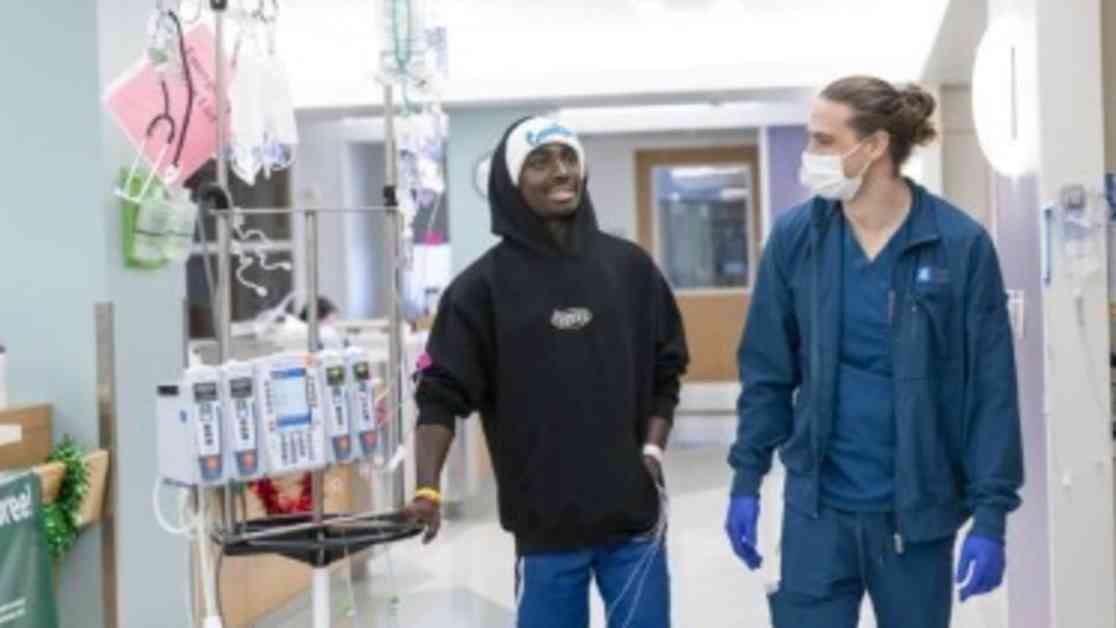Deshawn “DJ” Chow’s battle with sickle cell disease has been a long and painful journey. From his early teens, he faced excruciating pain episodes that made living a normal life seem like an impossible dream. Skipping school and frequent hospital visits became the norm for this resilient 19-year-old. The severe pain in his head and lower back was a constant reminder of the challenges he faced.
New hope emerged when sickle cell gene therapies were approved by the FDA just over a year ago. DJ’s adopted parents wasted no time in seeking out the City of Hope Children’s Cancer Center in Los Angeles to access this groundbreaking treatment for their son. The center welcomed DJ with open arms and swiftly navigated the complexities of securing authorization from the Chows’ employer-sponsored insurance. To their relief, almost all costs associated with the treatment were covered, thanks to the comprehensive insurance benefits.
DJ Chow is among a select group of patients at City of Hope to undergo treatment with Casgevy, a sickle gene therapy developed by Vertex Pharmaceuticals, with a steep price tag exceeding $2 million per patient. The treatment process involved multiple hospitalizations and additional chemotherapy treatments over the past year. Sickle cell disease, a blood disorder that distorts red blood cells into crescent shapes, disproportionately affects Black individuals and leads to severe pain episodes that frequently land patients in hospitals.
After completing the full course of Casgevy treatments in January, DJ Chow is cautiously optimistic about the future. He dreams of experiencing activities like snowboarding and surfing, pursuits he never thought possible due to his sickle cell condition. His journey is a testament to the transformative power of innovative therapies in providing hope and opportunities for a better quality of life.
### Slow Progress in Treatment Accessibility
While over 100,000 Americans grapple with sickle cell disease, younger patients with minimal organ damage stand to benefit the most from these new treatments. However, the process of scaling up treatment capacity has been sluggish. In the year since the FDA approved two gene therapies for sickle cell, only a little over 100 patients have undergone treatment.
Vertex Pharmaceuticals reported that 50 patients worldwide had undergone initial cell collections by the end of 2024. In comparison, Bluebird Bio revealed that nearly 60 patients had received treatment with their drug Lyfgenia, priced at over $3 million per patient. Furthermore, an additional 37 patients are slated to begin treatment with Bluebird’s therapy by early 2025.
While treatment centers have made strides in coordinating with insurers to secure coverage, challenges persist. Jennifer Cameron, Executive Director of Patient Access at Children’s National Hospital in Washington, D.C., highlighted the learning curve involved in navigating billing and coding guidelines with payers. Dr. Leo Wang, a pediatric hematologist-oncologist at City of Hope, acknowledged the smoother process but expressed concerns about the financial barriers presented by the high costs of these life-changing therapies.
### Paving the Way for New Payment Models
The exorbitant prices of sickle cell gene therapies have prompted discussions around developing innovative payment models to ensure broader access to these treatments. David Joyner, CEO of CVS Health, emphasized the need for alternative payment structures to alleviate the financial strain on healthcare systems. Collaborative efforts are underway to establish emerging risk pools at state Medicaid levels and among larger payers, distributing the costs more equitably across the board.
State Medicaid programs face a unique challenge in making these treatments financially feasible for low-income individuals. With over half of sickle cell patients covered under Medicaid, states like Georgia, Florida, and Mississippi with significant patient populations are particularly affected. The Biden administration’s Cell and Gene Therapy payment model aims to provide discounted pricing and funding support for new drugs, offering states a lifeline in managing the budgetary impact of these cutting-edge therapies.
As states grapple with the looming budget implications, the future of Medicaid coverage for gene therapies hangs in the balance. The need for sustainable funding mechanisms to support these groundbreaking treatments is paramount, ensuring that patients like DJ Chow can access the care they need without facing insurmountable financial burdens.
Health and Human Services Secretary Robert F. Kennedy Jr. underscored the importance of supporting research into gene therapies for conditions like sickle cell, recognizing the immense promise these treatments hold. Families like the Chows remain hopeful that advancements in gene therapy will pave the way for a brighter future, free from the shackles of pain and suffering. Their journey is a poignant reminder of the transformative impact of medical innovation in reshaping lives and fostering hope for generations to come.



















